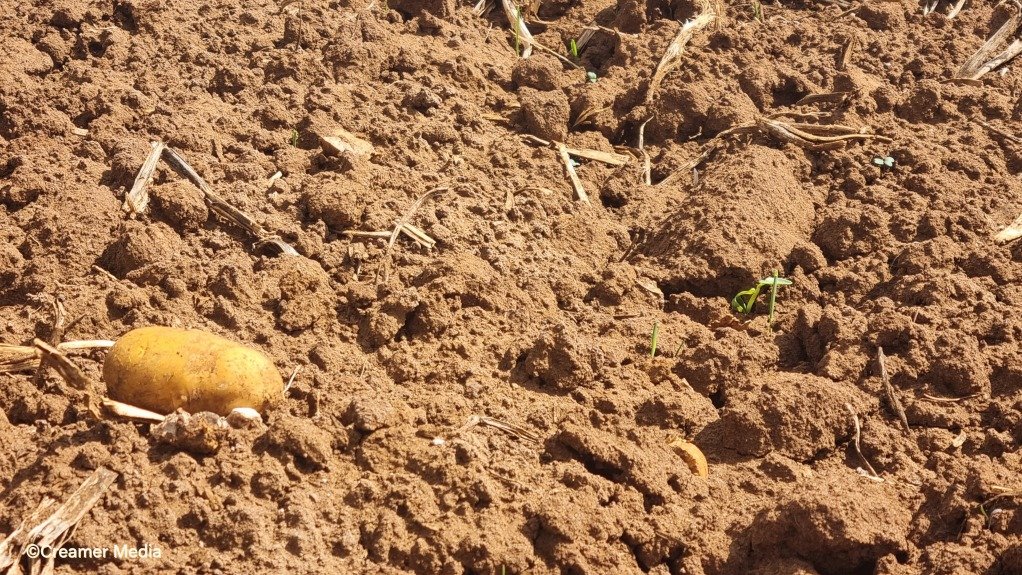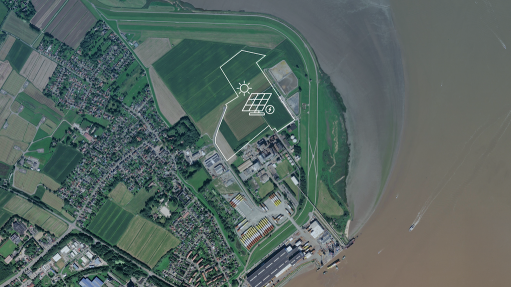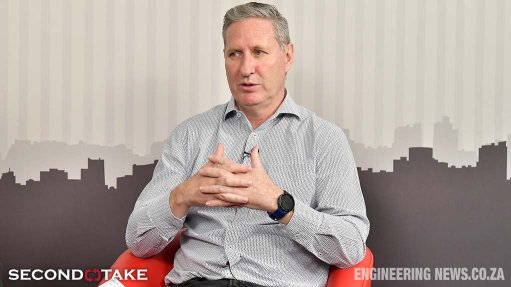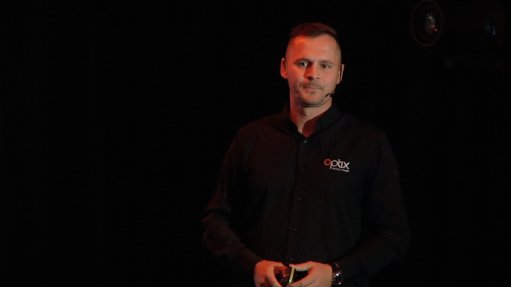McCain showcases Farm of the Future in Lichtenburg


Potatoes grown at McCain's Farm of the Future in Lichtenburg
Photo by Creamer Media's Marleny Arnoldi
Frozen food manufacturer McCain Foods has officially launched the second of three Farm of the Future farms in Lichtenburg, North West.
This follows the launch of the group’s first Farm of the Future, in Canada, in 2020, and precedes another to be built in Europe in the coming years.
The 550 ha farm in Lichtenburg serves as an experimental or research farm for McCain in Africa to refine the regenerative agricultural practices that it encourages its supplying farmers to employ, as well as the broader potato production industry.
Particularly, McCain uses the farm to investigate the best organic practices to control pests and plant diseases, as well as practices that are minimally invasive and damaging to the environment.
At the heart of McCain’s business is farming, but against a backdrop of a rapidly growing population, climate change, soil degradation, biodiversity loss and food waste, the future of the global food system is at risk.
To this end, regenerative agriculture encompasses an ecosystem-based approach to farming that strives to enhance farm resilience, yield and quality by improving soil health and biodiversity, while reducing the impact of synthetic inputs.
McCain global external affairs and sustainability VP Charlie Angelakos says the group’s Farm of the Future initiative not only showcases South Africa’s sector expertise but also the implementation of industry-leading regenerative agricultural practices that boost productivity and profitability, in a sustainable manner.
The farm also serves as an effective platform for recruiting and training talent, in line with labour and skills development ambitions of national government, and grants access to labs and facilities for stakeholders such as university researchers.
McCain Foods South Africa MD Unathi Mhlatyana says the group’s R100-million investment into the Farm of the Future Africa initiative at Lichtenburg demonstrates the company’s commitment to producing environment-friendly food and ensuring that sustainability is integrated into every touchpoint of the business’ value chain.
“Farm of the Future Africa will test and feature innovative processes and technologies, specifically tailored for the southern hemisphere, in a collaborative hive that brings together academics, industry, technology partners and farmers, to reimagine the way potatoes are grown for the betterment of the planet, farm yields and economic growth,” he explains.
Commenting on what this initiative means for the country in the current context, Agricultural Business Chamber chief economist Wandile Sihlobo says potatoes are a staple food for South Africans and an increase in the local production of sustainable spuds will have a significant impact on national food certainty, direct and indirect employment and the livelihoods of local farmers.
It will also assist the country in combating the effects of climate change, he adds.
In line with McCain’s resource efficient operations ethos, the Lichtenburg farm uses solar energy to power the farm’s main office and various machine sheds. The company is also investigating the use of solar for continuous deployment of field irrigation.
GOING DEEP
Some of McCain’s regenerative farming practices include planting several varieties of potatoes and nine species of cover crops.
Crop rotation is a vital aspect of building healthier soils and reducing the environmental impact of farming. It also helps to increase the organic matter in the soil, which builds nutrients and improves soil structure.
These practices also ensure higher yields and that crops are more resilient to extreme weather events.
The diverse cover crops planted at the farm support soil carbon cycling, reducing greenhouse gases released into the atmosphere.
McCain has also managed to greatly reduce the amount of chemicals needed for pest control and fertilising by using natural, innovative ways of farming.
For example, planting radishes on a rotational crop basis meddles with the reproduction of a certain pest – a small worm that can lie dormant in the ground for 18 years. This reduces the amount of pesticides needed to control the pest.
The Farm of the Future uses technologies from I-crop irrigation, scheduling under pivots irrigation to continuously monitor scheduling, equipment efficiency and moisture status, per pivot.
Additionally, there is ongoing evaluation of drop and floppy irrigation systems for water use improvements to minimise run-off.
On the machinery front, McCain will soon install load cells on harvesters to provide the most accurate yield maps to improve yield estimation and identify high- and low-productivity areas on the farm.
McCain plans to use variable planting data from the yield map and scan of subsoil conditions to identify the optimal areas for planting, which will reduce waste and boost yield.
Additionally, the Farm of the Future leverages precision agriculture company Picketa Systems’ nutrient sensor technology to analyse plant tissue in real-time, allowing a greater understanding of plant nutrient concentration.
Soil disturbance is minimised through controlled-traffic farming on potato fields and fall bedding to reduce tillage.
Tractors with a wider wheel base and global positioning satellite technology are key to controlled-traffic farming, as it limits where heavy machinery can be on the field.
Crop roller crimping is also used as a way to mechanically terminate cover crops, while supressing most weeds and preventing soil erosion.
In partnership with a neighbouring farm, McCain has integrated cattle in green manure fields at the Lichtenburg farm. A rotational grazing schedule helps improve soil health, reduce fertiliser input and increase carbon sequestration.
More benefits of rotational grazing include better forage quality, faster plant recovery, even distribution of manure and better ecosystem biodiversity.
Mhlatyana points out that fertiliser is a major source of carbon emissions in potato farming, therefore, the less fertiliser that is used, the better.
North West Agriculture MEC Desbo Mohono says the province last year launched a potato farming programme, which helps farmers sustainably increase supply to food manufacturers such as McCain.
She says local municipalities are also working with beekeepers to assist farmers with better production.
Mohono believes the advancement of the province and the country’s agricultural sector lies in public-private partnerships and empowering young people. She hopes McCain will continue to thrive and expand its positive impact in the province.
Comments
Press Office
Announcements
What's On
Subscribe to improve your user experience...
Option 1 (equivalent of R125 a month):
Receive a weekly copy of Creamer Media's Engineering News & Mining Weekly magazine
(print copy for those in South Africa and e-magazine for those outside of South Africa)
Receive daily email newsletters
Access to full search results
Access archive of magazine back copies
Access to Projects in Progress
Access to ONE Research Report of your choice in PDF format
Option 2 (equivalent of R375 a month):
All benefits from Option 1
PLUS
Access to Creamer Media's Research Channel Africa for ALL Research Reports, in PDF format, on various industrial and mining sectors
including Electricity; Water; Energy Transition; Hydrogen; Roads, Rail and Ports; Coal; Gold; Platinum; Battery Metals; etc.
Already a subscriber?
Forgotten your password?
Receive weekly copy of Creamer Media's Engineering News & Mining Weekly magazine (print copy for those in South Africa and e-magazine for those outside of South Africa)
➕
Recieve daily email newsletters
➕
Access to full search results
➕
Access archive of magazine back copies
➕
Access to Projects in Progress
➕
Access to ONE Research Report of your choice in PDF format
RESEARCH CHANNEL AFRICA
R4500 (equivalent of R375 a month)
SUBSCRIBEAll benefits from Option 1
➕
Access to Creamer Media's Research Channel Africa for ALL Research Reports on various industrial and mining sectors, in PDF format, including on:
Electricity
➕
Water
➕
Energy Transition
➕
Hydrogen
➕
Roads, Rail and Ports
➕
Coal
➕
Gold
➕
Platinum
➕
Battery Metals
➕
etc.
Receive all benefits from Option 1 or Option 2 delivered to numerous people at your company
➕
Multiple User names and Passwords for simultaneous log-ins
➕
Intranet integration access to all in your organisation


















